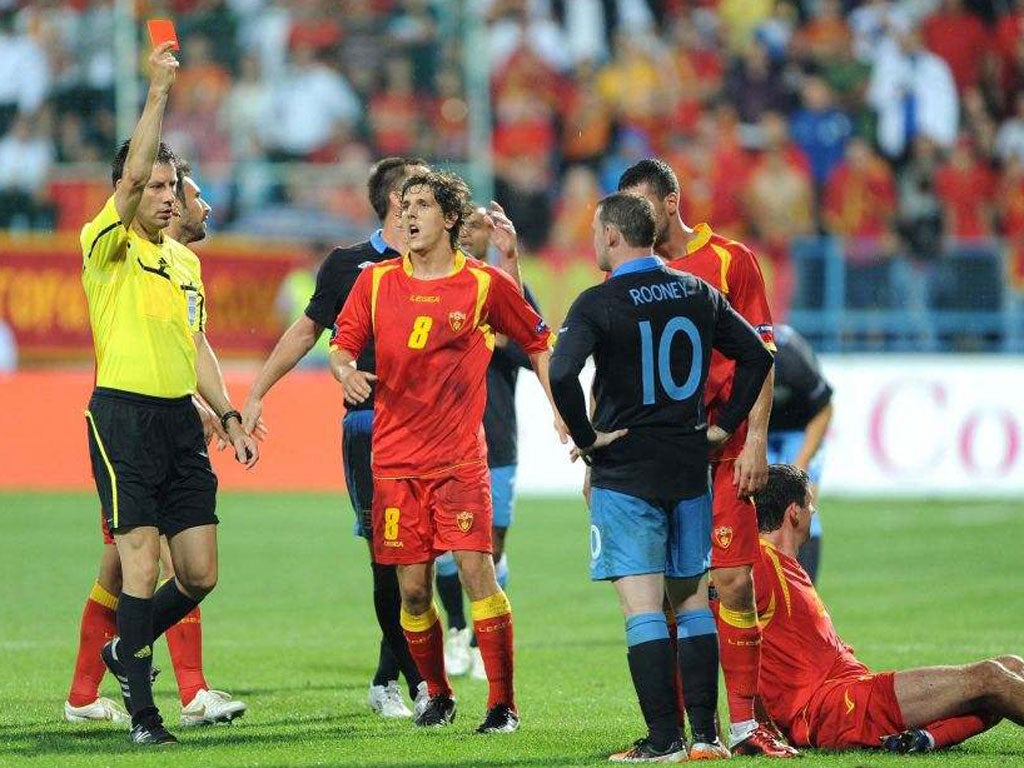
There is an element of those who classify themselves as supporters of the England team who are predisposed to taking a pleasure in the many and various disasters that befall our benighted national team. If they involve Wayne Rooney, well, so much the better.
Red card against Montenegro and a three-match ban? Good. He's an idiot. He deserves it. Ban him for longer. Actually, don't even take him at all. England have got exactly what they deserve. Those same people will regard Rooney's appeal in Nyon, Switzerland, on Thursday against his three-match ban at Euro 2012 as the self-regarding act of English football's most over-indulged superstar. They would be wrong.
Precedent and common sense dictate that Rooney's ban should be reduced to two games, leaving him eligible to play in England's final Group D game against Ukraine on 19 June. Rooney (above) has done some daft things in his time but this punishment does not fit the crime.
The case most commonly cited in Rooney's favour is that of Andrei Arshavin, who received a two-game ban for Euro 2008 when he was sent off for Russia against Andorra in his country's final qualifying game for the tournament. The similarities are hard to ignore. Like Rooney's red card against Montenegro, Arshavin's dismissal was for a petulant kick at an opponent off the ball. Arshavin, according to the reports at the time, did not have to go to appeal. His two-game ban was the punishment laid down by Uefa's control and disciplinary body, the same body that banned Rooney for three matches.
The other case that strengthens Rooney's appeal is that of Tom Huddlestone, sent off for England against Wales in the second leg of an Under-21 European Championship qualifier in October 2008. Huddlestone was initially given a three-match ban, meaning he would have missed all three of the championship group games the following summer. Two months later it was reduced on appeal to two matches.
The point in Huddlestone's case, and in Rooney's, is that international tournaments are a different proposition to domestic football. Had Rooney committed his offence against Miodrag Dzudovic in Podgorica in the Premier League, he would have been banned for three matches for violent conduct. But the Premier League is a 38-game season. The finalists at Euro 2012 will play only six games.
By their very nature, international tournaments are compressed and intensive. To reflect that, Fifa changed the rules at the last World Cup finals to create an amnesty on yellow cards after the quarter-final stage in order that players on one booking did not go into the semi-final fearing another caution would mean they would potentially be suspended for the final.
It is not a case of bending the rules to allow the best players to participate, but about acknowledging that a five-week tournament unfolds in a different way to a 10-month league season with different pressures and demands on players. To ban Rooney for 50 per cent of the tournament would be disproportionate.
Some have accused the Football Association of hypocrisy for appealing Rooney's ban given that, had he committed the offence for Manchester United, the governing body would have given him an automatic three-game ban. It is a fatuous argument that ignores the difference between domestic and tournament football.
What the European governing body need to bear in mind on Thursday is that this is not a case of it cutting a star footballer down to size, or teaching Rooney a lesson. Its job is to administer a fair punishment which, for all the mistakes Rooney has made over the years, means a two-game ban rather than three.
Subscribe to Independent Premium to bookmark this article
Want to bookmark your favourite articles and stories to read or reference later? Start your Independent Premium subscription today.

Join our commenting forum
Join thought-provoking conversations, follow other Independent readers and see their replies